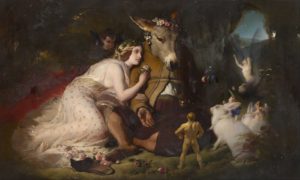Gogo was raised by her uncle, George Sale, after her mother died and her father left for Argentina. Her father never returned from South America, and whether he was alive or dead she never cared to find out.
Her uncle was a large man. He had a strong jaw and head shaped like an anvil. His words carried the same sort of weight. Though – he didn’t say much. Their house was large enough that they were able to coexist while rarely crossing paths. Gogo told me she could dissolve into a glass of water when he yelled for peace and quiet.
The house was built at the edge of the Oxtail River. When I visited we stayed in her room. If we were hungry we left her house and went to the small diner nearby. If her uncle was in a bad mood we stayed at my house instead, hiding beneath the covers of my bed so that my parents wouldn’t know she was there. We were safe beneath the blankets, lying close together and whispering about where we would go tomorrow, next month, next year, forever.
We read books out loud to each other: The works of the Russian masters and American classics – like An American Tragedy when we found a used copy. We read Waiting for Godot, which was one of her favorites, and promised we would see it performed live someday after we saved enough money. We read the poetry of Derek Walcott and wondered how so much could be said in so few words.
My parents never caught us. Gogo always slipped through the window before sunrise. Before my father started making jokes at the breakfast table where I pretended to laugh.
My father always said, “You can’t be a writer if you’re not willing to read and you can’t be a boxer if you’re not willing to bleed…”
“Or – perhaps it’s the other way around.”
But he was neither.
Gogo’s uncle and my father met only once. They argued about politics and then shook hands and agreed, silently, that they should never meet again. George Sale was a surprisingly conservative man when it came to politics, my father said. And so very staunch in his beliefs. There was no use talking to him at all.
My father told my mother this at dinner . Then they both looked at me, and then at Gogo, who was over for the meal (and, secretly, for the night), with a sort of sad look I still don’t understand. It might have been a look of sadness – for Gogo stuck alone with her uncle. Or a worry, as they were worried often about the future, and worried about jobs and the climate and the direction the country was headed and still is. They looked at us in the way that only parents can, and perhaps even they didn’t know exactly what it meant – the result of a deep-rooted feeling somewhere in their stomachs over my mother’s mashed potatoes and peas.
Family For Sale
Gogo hated her uncle. She said as much, but only in her sleep. When I asked her about it during waking hours she denied it and said she was indifferent, “He’s like any adult,” she said, “they’re all confused,” and then she refused to talk any more about it. Then at night, beneath the covers, she would call out or whisper, her eyes still closed, all of the things she wouldn’t say to me when the sun was out.
I was her escape. This much I knew. And I was happy to be that and nothing more.
It wasn’t just that he told her she couldn’t do something – this happens often, and to almost everyone living in this world without freedom. It wasn’t just that he told her she couldn’t be something, either, for while that does certainly limit a girl’s ambition and resolve, Gogo was the sort that didn’t listen to the opinions of others in the first place. She didn’t care anyway, decided to work harder, and did. And he never touched her, not physically, or in any sort of inappropriate way; he was not that type of villain. He was simply unaware, emotionally cold, so self-centered that he never once realized how his actions, or his lack-of-action, affected her. As she grew older, she came to see others the way he saw her: As faceless, devoid of anything that didn’t directly benefit or aid in her goals. Nothing more than a shape. As talking and eating, perhaps, and that was all.
It was like her idea of Othello’s marriage to Desdamona – Gogo believed that the great Moor of Venice had never truly loved his wife, before, after, or ever at all. If he had, she said, he would never have murdered her – and certainly not on such easily-refutable grounds. Had he loved her, he would have found it in himself to forgive her; she always called Desdamona nothing more than a trophy wife for Othello. Simply a prize of his station. The ultimate symbol of his accomplishments as a minority in the white man’s world. Gogo was never shy about calling Othello vain. And she was never shy about accusing Shakespeare of knowing nothing about women.
Though – she said – to be fair, the first 118 of his famous sonnets were written to a man.
Her uncle put their house on the river up for sale the moment she turned 18 and left for college in Iowa. I never saw her again after she left for school, and she never called or wrote. I never saw her uncle again either, though in that I had no interest in the first place.
The river rose during a thunderstorm in the spring a few years later. The winds blew so hard the house shook and shivered and then collapsed completely into the mud of the river bank. The pieces of it – Gogo’s bedroom, the quiet kitchen (quieter still), the living room windows, doors, carpet – still lie there in ruin.
The land is for sale. No one has purchased the lot. And – no one will, I imagine, until the remains of the house are cleared away for good.
Read this next: To Be So In Love

